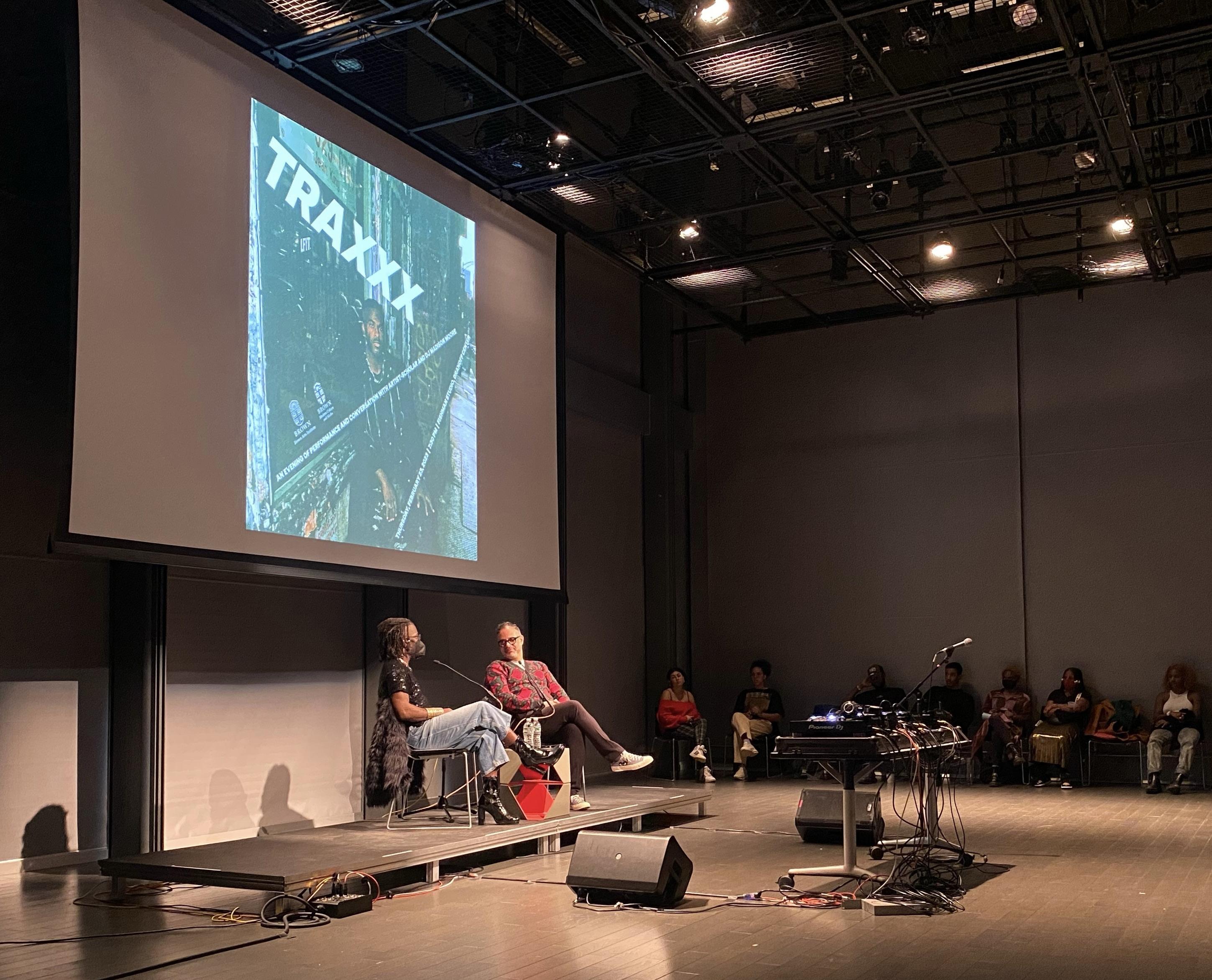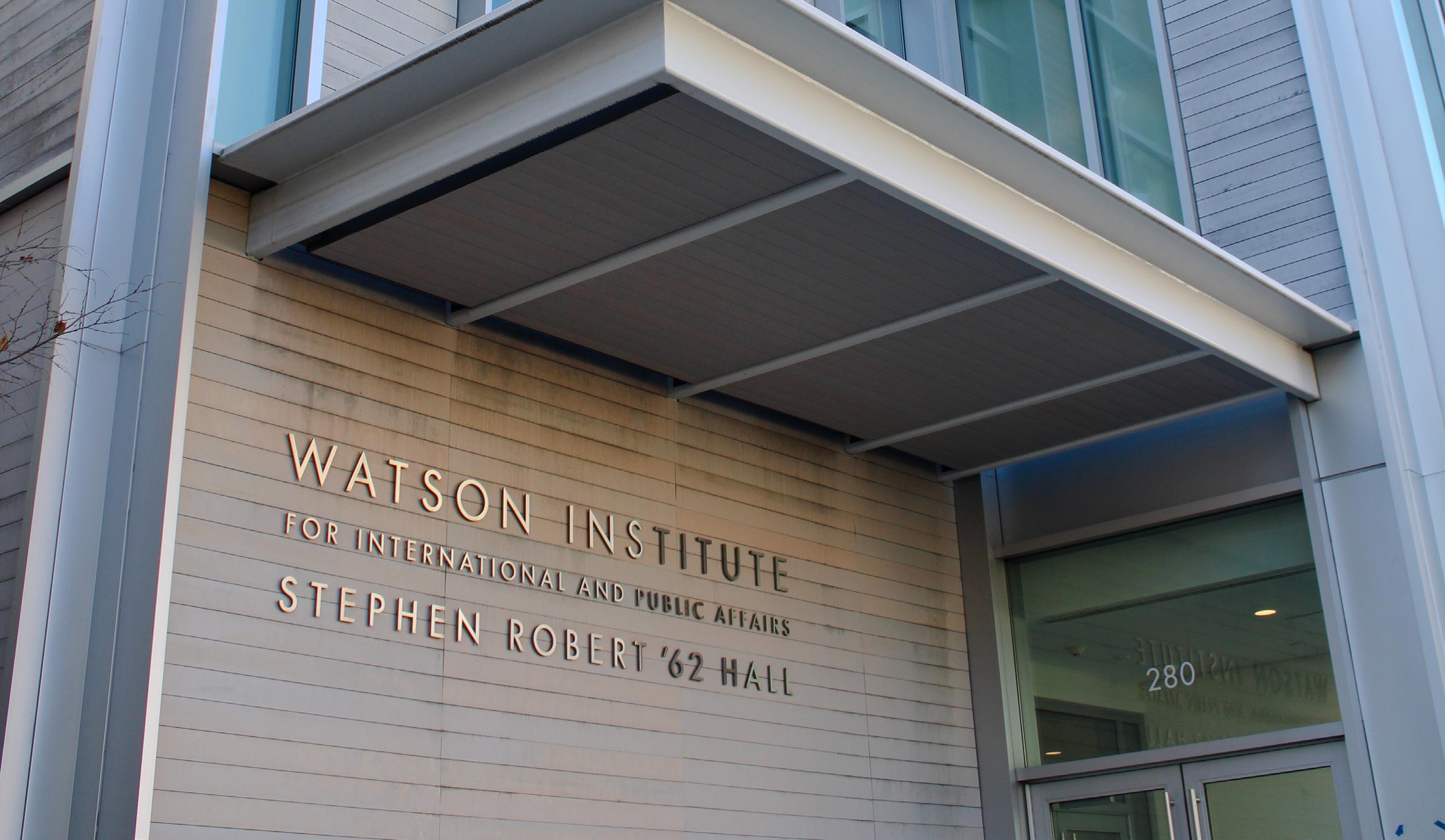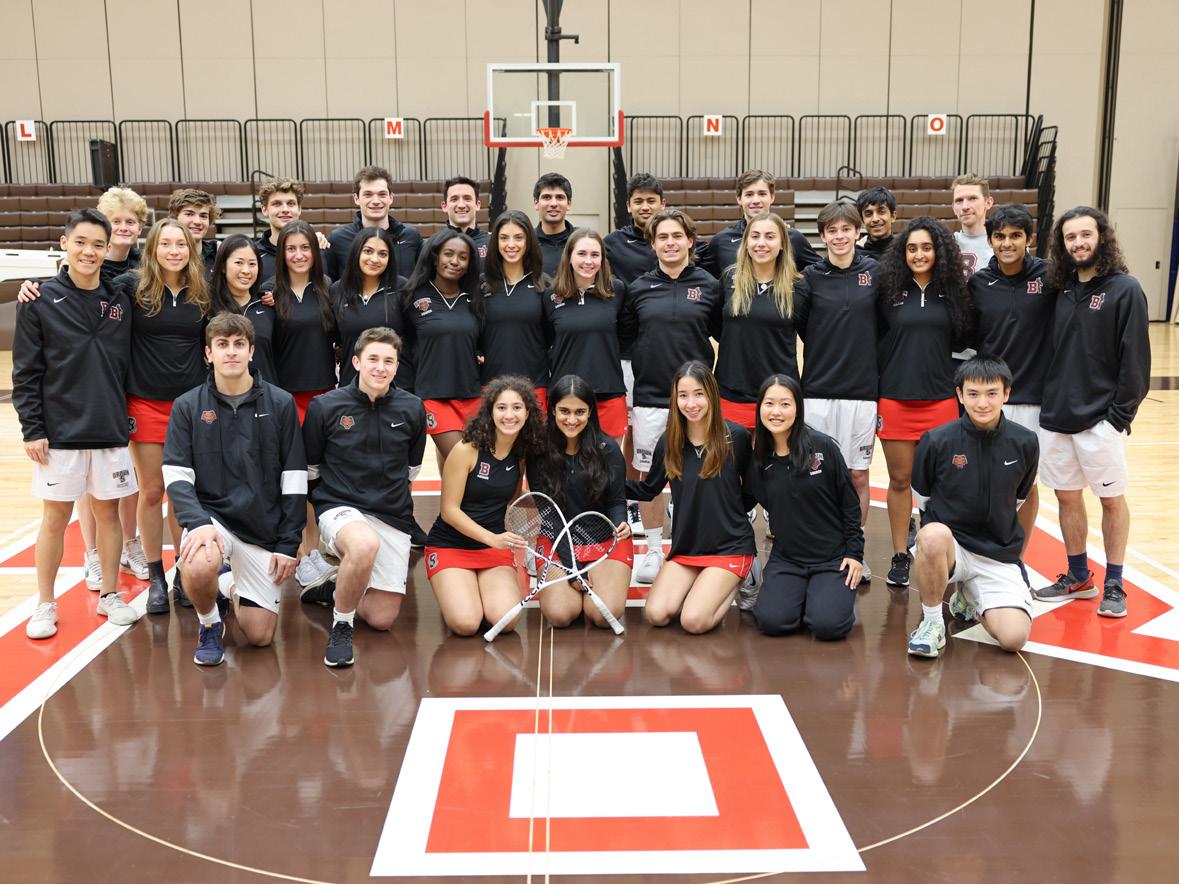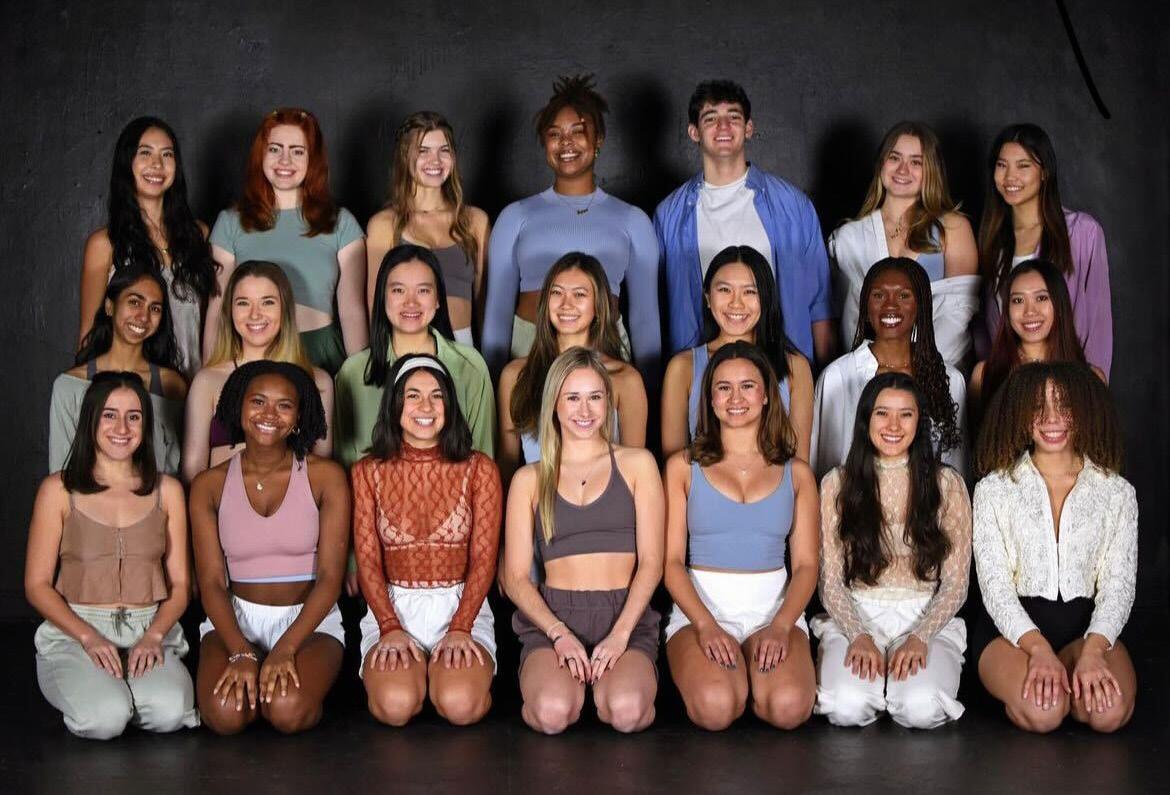
7 minute read
THE BROWN DAILY HERALD
133rd Editorial Board
Editor-in-Chief
Advertisement
Will Kubzansky
Managing Editors
Katy Pickens
Alex Nadirashvili
Senior Editors Augustus Bayard
Caleb Lazar
Peter Swope
Kaitlyn Torres
Post- Magazine
Editor-in-Chief Kimberly Liu
News Metro Editors
Emma Gardner
Rhea Rasquinha
Jacob Smollen
Julia Vaz
Science & Research Editor
Haley Sandlow
Senior Science & Research Editor
Gabriella Vulakh
Arts & Culture Editors
Aalia Jagwani
Finn Kirkpatrick
Rya Vallabhaneni
Sports Editor Linus Lawrence
University News Editors
Sofia Barnett
Charlie Clynes
Emily Faulhaber
Grace Holleb
Sam Levine
Neil Mehta
Haley Sandlow
Kathy Wang
Digital News Director of Technology
Swetabh Changkakoti
Opinions
Editorial Page Editor
Head Opinions Editor
Alissa Simon
Opinions Editors

Anika Bahl
Bliss Han
Melissa Liu
Jackson McGough
Multimedia
Illustration Chief
Ashley Choi
Photo Chiefs
Elsa Choi-Hausman
Dana Richie
Photo Editors
Mathieu Greco
Claire Diepenbrock
Rocky Mattos-Canedo
Lilly Nguyen
Kaiolena Tacazon
Social Media Chief
Sahil Balani
Social Media Editors
Emily Faulhaber
Kaiolena Tacazon
Production
Copy Desk Chief
Brendan McMahon
Design Chief
Neil Mehta
Design Editors
Sirine Benali
Maddy Cherr
Ashley Guo
Gray Martens
Business General Managers
Joe Belfield
Andrew Willwerth
Sales Director
Alexander Zhou
Finance Director
Eli Pullaro
Submissions: The Brown Daily Herald publishes submissions in the form of op-eds and letters to the Op-eds are typically between 600 and 900 words and advance a clear argument related to a topic of campus discourse. You can submit op-eds to opinions@browndailyherald.com.
Letters to the editor should be around 250 words and respond to an article or column that has appeared in The Herald, or critique or commend The Herald’s editorial decisions. You can submit letters to the editor to letters@browndailyherald.com.
Submissions undergo multiple rounds of editing. These rounds of editing generally take place over the course of one evening, and you may have to respond to edits late in the evening. If you know you will be unable to do so, please mention that in your email, and we will do our best to work with you.
Submissions can build on reporting from The Herald, reporting elsewhere, official statements from the University or other groups and other reputable sources, but they cannot break news or contain information that The Herald cannot verify. Because we cannot publish unsubstantiated information, failure to provide appropriate sources may mean we have to modify or remove unverified claims.
The Herald will not publish anonymous submissions or submissions authored by organizations. Leaders of student organizations can be identified as such but cannot write under the byline of their organization. The Herald cannot publish all submissions it receives and reserves the right to edit all submissions.
All submissions to The Herald cannot have been previously published elsewhere (in print or online — including personal blogs and social media) and must be exclusive to The Herald. Once your submission is published in The Herald, The Brown Daily Herald, Inc. owns the copyright to the materials.
Commentary: The editorial is the majority opinion of the editorial page board of The Brown Daily Herald. The editorial viewpoint does not necessarily reflect the views of The Brown Daily Herald, Inc. Columns, letters and comics reflect the opinions of their authors only.
Corrections: The Brown Daily Herald is committed to providing the Brown University community with the most accurate information possible. Corrections may be submitted up to seven calendar days after publication. Periodicals postage paid at Providence, R.I. Postmaster: Please send corrections to P.O. Box 2538, Providence, RI 02906.
Julian Beaudry
Kate Waisel
@the_herald facebook.com/browndailyherald
@browndailyherald @browndailyherald
Advertising: The Brown Daily Herald, Inc. reserves the right to accept or decline any advertisement at its discretion. 88 Benevolent, Providence, RI (401) 351-3372 www.browndailyherald.com Editorial: herald@browndailyherald.com Advertising: advertising@browndailyherald.com
The Brown Daily Herald, Inc. is a financially independent, nonprofit media organization bringing you The Brown Daily Herald and Post- Magazine. The Brown Daily Herald has served the Brown University community daily since 1891. It is published Monday through Friday during the academic year, excluding vacations, once during Commencement and once during Orientation by The Brown Daily Herald, Inc. Single copy free for each member of the community. Subscription prices: $200 one year daily, $100 one semester daily.
Copyright 2023 by The Brown Daily Herald, Inc. All rights reserved.
This week, undergraduate teaching assistants in Brown’s Department of Computer Science will vote to determine whether the Brown administration must legally recognize and bargain with our union, the Teaching Assistant Labor Organization. We are pursuing unionization because we believe in democracy, justice, equity and a spirit of collaboration, care and community. These values stand in contrast to how the department is currently run, as it’s no secret that the program is riddled with difficulties surrounding TA working conditions. We implore CS TAs to vote “yes” this week to improve our workplace and our community by winning the first undergraduate union on campus.
Today, CS TAs must often and unfairly choose between their responsibilities as workers and their lives as students and people. TAs serve as the face of their courses, sometimes even playing the role of professors. This is not just because our CS TAs are hardworking and ambitious, but rather because they are overworked and exploited. For example, the head teaching assistant job description explicitly instructs TAs that they “should do whatever (they) feel is important to keep the class running smoothly,” leaving no room to consider the intense pressure and emotional burden that comes with that responsibility. The department fosters an environment where working overtime is not always a choice, but an obligation — the alternatives are either burdening their fellow TAs with more work or letting students suffer the consequences.
These issues could seem like acute one-offs or just fallout from the COVID-19 pandemic. Unfortunately, this couldn’t be further from the truth. In 2019, Arthur Borém ’20 led a shortterm research project studying the CS TA program, which resulted in a research paper co-authored with the Sheridan Center’s Associate Director for Undergraduate STEM Development Christina Smith. It describes the tensions and pressures that TAs faced back then, and they’re nearly identical to the issues that TAs face today, four years later. TAs noted that “the presence and influence of professors (are) not guaranteed,” while developing course content. Similarly complex responsibilities, such as manag- ing grades or writing rubrics, were performed “without training or guidance.” Just like today, TAs felt “like they (were) ‘failing’ their students when prioritizing their own schoolwork.”
In the same year, 2019, the University formed a working group composed of students and faculty from multiple different departments that reviewed University practices for all TAs, resulting in a set of revised guidelines that were approved in 2021. The working group included Borém and Smith as well as Tom Doeppner, the current vice chair of the Department of Computer Science. In the executive summary systemic and unrelenting, and though we are not the first to realize this, our issues have persisted.
By building a union, we aim to address these issues by fighting against the continual churn of the undergraduate condition, which erodes institutional memory. As CS TAs, we are temporary workers in a deeply decentralized workplace. We’re spread across dozens of courses in a given semester, working in different roles, all with their own responsibilities and histories. Most TAs only work for one or two semesters and graduate in four years. While our union’s membership will change over time, TALO’s challenge us to explore new ideas. We spend our free time studying for interviews, taking online assessments and building projects to put on our resumes. And, we accept course loads that quite literally have us working overtime — three CS courses in one semester can easily add up to more than 40 hours of work a week. of their review, the working group cited the issues identified in Borém and Smith’s paper and found that for TAs across the University, the situation was unacceptable.
Interrupting this culture of overwork starts with our union. TA working conditions set an example for how all CS students expect to be treated as workers. As first-years, many of us looked up to our TAs as mentors and role models. But, when we see our mentors stay after hours or work while they’re not on the clock, we are implicitly told that overwork and a lack of boundaries are not only the norm — they are expected.
As TALO, we are organizing to protect students and TAs by fostering transparency and accountability. Currently, the department and University are under no obligation to include us in decisions that impact our everyday working conditions or even provide a transparent explanation of their decision-making processes.
The report noted that TAs were engaging in complex teaching practices, such as course development, without much support. There were also concerns about equity gaps, “access to TA opportunities themselves” and the administrative process: “There is not much consistency in regards to recruitment, hiring, training, and supervision of TAs.”
This report was revealing, but ultimately, the working conditions of TAs did not change. In Spring 2022, a group of TAs authored an open letter that they presented to administrators in the computer science department. Again, the same issues — overwork, inadequate pay, insufficient infrastructure — were outlined. But, other than winning a nominal pay raise, little changed.
The issues experienced by CS TAs today are power to preserve our experiences and centralize our efforts — both formally and informally — will remain.
Winning a union is not just about looking to the past and securing better conditions for TAs — it’s also about protecting students’ futures. The work culture in college primes students to expect and accept mistreatment from employers. Tech companies seek workers who will put their jobs first, clock 80-hour weeks and run on little sleep and a lot of caffeine. Recently, we have been reminded of tech workers’ working-class positionality, as loyal senior developers and new grads alike are laid off as companies brag about record profits.
Brown facilitates this culture of overwork by asking students, TAs, faculty and staff alike to sacrifice mental and physical health for programming assignments, academic paper deadlines and recruitment cycles. As students, we find ourselves taking classes that we hope will teach us marketable technical skills rather than
A clear example of this is Brown’s recent decision to pause all TA hiring until after the March 2 union election. Not only did this unexplained move create an immediate headache for the meta TAs who oversee hiring, but it threatened to push hiring timelines into finals period and the summer. After public pushback against this decision, the administration opted to resume hiring. This is the power we wield when we stand together. This is the power of a union.
Voting “yes” for our union is the first step to building a department where TAs’ experiences are preserved and valued, where TAs have a real voice in their working conditions and where students receive the world-class CS education that Brown promises.
Ronnie Shashoua ’25 can be reached at ronnie_shashoua@brown.edu. Yasmine Abdelaziz ’25 can be reached at yasmine_abdelaziz@brown.edu. Joseph Maffa ’25 can be reached at joseph_maffa@brown.edu. Please send responses to this opinion to letters@browndailyherald.com and other opeds to opinions@browndailyherald.com.






